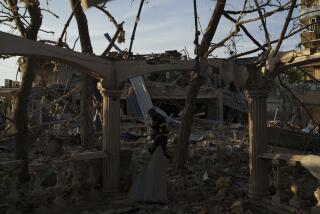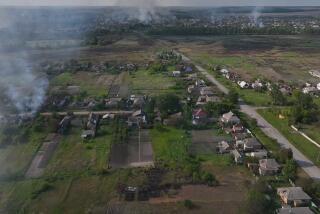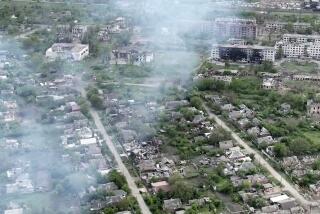There are few signs of damage by Russia in western Georgia
POTI, GEORGIA — Government officials of this small, war-weary country invited a group of journalists for a 180-mile trip aboard a Russian-made Mi-8 helicopter Monday to Georgia’s western provinces to show the damage wrought by the recent Russian military incursion.
Instead, the 19 international journalists on a daylong tour found just a few signs of Russian destruction, not very evident amid the sleepy resort towns of the Black Sea coast and the lush inland valleys.
Just as Russians are suspected of having exaggerated the number of casualties and damage in the initial Georgian offensive that sparked the war in Georgia’s breakaway region of South Ossetia, Georgians appear to have stretched the facts on the extent of destruction caused by the subsequent Russian attack, at least here in the country’s west.
“This conflict is very much about proving who is the bad guy,” said a Western diplomat in Tbilisi, the Georgian capital, speaking on condition of anonymity.
Russians have damaged western bases of the Georgian army, which they accuse of launching the Aug. 7 assault on civilians in South Ossetia, about 125 miles east of here.
The Russians blew up about a dozen boats at the naval base here in the Black Sea port of Poti. The mangled Georgian coast guard ships lay half sunk in the water, victims of bombs set by Russian soldiers, witnesses said. The base itself was looted and several military personnel were killed in an airstrike on the facility, an official said.
The sunken ships have clogged the berths, in effect shutting the base. Leaking boat fuel has fouled nearby waters.
The civilian section of the port was largely untouched, aside from minor damage to facilities and windows apparently broken by blast reverberations.
At least in western Georgia, the Russians appear to have used force minimally. Communications function, and electricity is uninterrupted.
Civilian fatalities in Georgia proper have climbed at least into the double digits, but the Russians appear to have avoided any inadvertent high-profile attacks on civilian targets. The Georgian Health Ministry reported two days ago that 67 civilians had been killed and about 157 hurt in the conflict.
The Russians appear to have carefully calibrated their intervention to cause minimum damage while exerting maximum political pressure. In the city of Zugdidi, Russian soldiers have occupied a villa that locals said belonged to Georgian President Mikheil Saakashvili, the flashy and outspoken 40-year-old the Kremlin has demanded step aside.
The shirtless soldiers inside the villa could be seen hurrying off a deck where they were apparently sunbathing after the gaggle of journalists began taking photographs.
Zugdidi lies near Georgia’s border with Abkhazia, another pro-Russian breakaway province. Early in the conflict, Georgian officials in Tbilisi warned of an impending disaster as Russian tanks from Abkhazia massed at Zugdidi’s edge.
But residents said there had been little or no damage to their town, though they were nervous about the increased presence of Russian troops.
“We’re afraid because of the situation, because of the Russians,” said Irakli Gulava, a student in his 20s strolling through a park in downtown Zugdidi. “But the Russian soldiers were afraid also of meeting with the Georgians. Eventually, they were asking the people to give them food, drinks and water.”
Despite claims that Russia is destroying Georgia’s civilian infrastructure, much of it remains intact in the country’s west. Residents said shops were full. In the resort city of Batumi, residents could be seen swimming off the pebbly beaches of the Black Sea.
Residents said they worried that the effects would show up in coming years, as tourists shied away from what was becoming a thriving travel destination for Europeans.
“We have food and water,” scoffed Mazia Jwania, a 50-year-old housewife walking with friends along a street in downtown Poti. “But in the last couple of years, life here was getting so much better. Now it’s going to go backward.”
--
More to Read
Sign up for Essential California
The most important California stories and recommendations in your inbox every morning.
You may occasionally receive promotional content from the Los Angeles Times.










